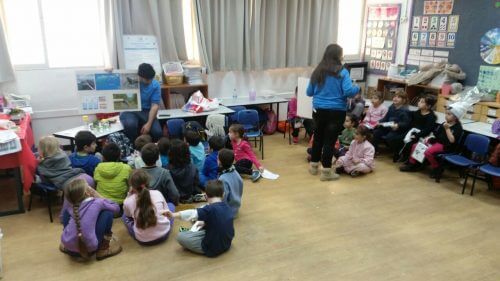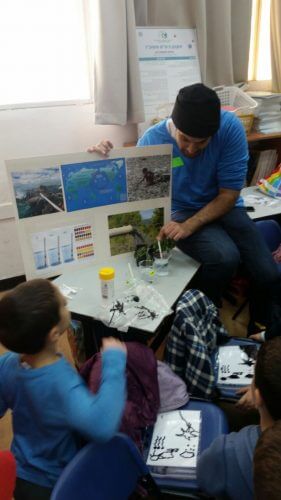There is a wide consensus that in face-to-face learning, the size of the group is a factor influencing the effectiveness of learning. Class sizes are presented in the media as a problem in the state education system, and quite a few efforts are being made to reduce class sizes. On the other hand, questions about the influence of the nature of the group do not come up for public discussion at all, even though scientific research in this field can lead to a revolution in the form of education in schools and academia.

This work was carried out within the framework of the "Green Ambassadors" training course in the community, which is operated within the framework of courses involving action phases at the Technological Institute in Holon HIT, funded by the HOT and supported by the Social Engagement Unit under the direction of Dr. Chen Freeman.
The course deals with a number of important environmental issues. Among the goals of the course, increasing environmental awareness among the students and making the knowledge accessible to the young school students in grades A and B in an experiential way, in order to educate a generation of children with high environmental awareness. The work, carried out by Omri Demarmari, Vared Imi Lidsky and Ayelet Shammai, examined the effect of the gender division in the group, on the effectiveness of learning.
For this purpose, an experiential training system was built, on the subject of the water system in Israel.
We presented this array to the students of grades XNUMX-XNUMX at the "Ravivim" elementary school in Holon.
Each class was divided into 3 groups of equal size (the division into groups was done by distributing stickers of different colors). The division into these groups was maintained throughout the activity. One group included only girls, a second group only boys and a third mixed group, where the number of girls and boys is equal.
We exposed each of the groups to three experiential sessions: one session taught the students what the pH value (pH) of water is, in this session the students experienced pH value tests with automatic instruments and indicators.

The second session explained to the students about the composition of the aquifer and even experimented with filtering polluted water. The last activity was studying the principles of the water cycle and creating a suitable model.
During each and every session we examined criteria for the effectiveness of learning in the group: level of listening, cooperation between the students, the number of questions and more.
From the practical experience at the school, we concluded that the girls' group and the mixed group stood out for listening a lot during the session, fewer interruptions and more substantive questions.
We verified understanding by a quiz presented to the entire class, about the contents of the sessions, in this quiz it appeared that students from the girls' group and the mixed group knew how to answer the questions more quickly, and in contrast, students from the boys' group who were apparently unable to internalize the knowledge they had acquired hesitated in giving answers .
These experimental results are the basis for conducting a more comprehensive study that will test the effect of the nature of the group on the effectiveness of learning.
It is clear that experiential learning of experience led to more effective learning than that acquired through face-to-face learning alone.

2 תגובות
Is anyone here stressed? And didn't even notice that it was a sample of 1 out of 1? And that it is all about "a basis for existence for more comprehensive research"?
One can only hope that other elements of the group's composition will be examined, apart from the gender of the participants.
Aha…
So the boys are stupid and the girls are super smart who develop wisdom from the first grade and that's why we need to invest in feminist education... ahem...
(Or maybe I missed something in this unclear article..?)
In any case, if this "experiment" shows correct results, then we should already see women who rule the world through the development of new technologies and those who win the Nobel Prize for everything possible.... Oh yeah, I forgot - it's a misogynist world because Bibi is prime minister and loves pistachio flavored ice cream... oh and Trump was just elected...